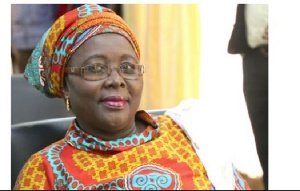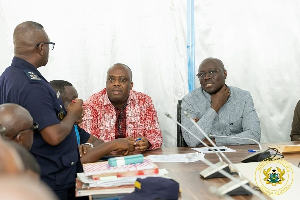The Ghana Catholic Bishops’ Conference on Friday held a multi-stakeholder Conference to sensitise Ghanaians on the upcoming referendum on the election of Metropolitan, Municipal and District Chief Executives (MMDCEs), slated for December.
The workshop sought to promote effective representation and accountable local governance and in particular, the direct participation of political parties in local government elections and the election by the people of their MMDCEs instead of appointment by the President.
The workshop, which was organised by the Ghana Catholic Bishops’ Conference with funding from the Konrad Adenauer Stiftung, was attended by representatives from Political Parties, parliamentarians, ministers of state, and representatives of the Electoral Commission (EC), religious groups, civil society and academia.
It would be recalled that the NPP Government in its campaign, prior to the elections of 2016, proposed direct election of the MMDCEs on the basis of political party representation rather than appointment by the President.
This is expected not only to deepen democracy at the local level, but also make the MMDCEs more accountable to the people of the District.
However, as Article 55 (3) of the 1992 Constitution prohibits political party sponsorship of candidates for elections to District Assemblies or local government units, the Government proposes a referendum to amend the constitution to allow for the election of members of district assembly and MMDCEs based on political party representation.
Bishop Philip Naameh, Chairman of the Ghana Catholic Bishops’ Conference in a speech read on his behalf said when successful at the constitutional amendment, the election of the MMDCEs would mark a turning point in local governance and development in the country.
He said even though the referendum was expected to take place in December, little was heard of it in the public discourse. “The Ghana Catholic Bishops’ Conference finds it rather worrying that such an important national exercise does not receive the level of participation in the discussions leading to this important national exercise which, if successful, will lead to the amendment of an important entrenched article of the national constitution.”
He said the Ghana Catholic Bishops’ Conference supports efforts of Government and stakeholders that enhance the capacity of the people to make decisions that affect their lives and communities.
“As we have done in the past the Ghana Catholic Bishops’ Conference will offer its support, once again, to the Government, the EC, the National Commission on Civic Education and other stakeholders to create awareness and understanding of the issues at stake during the referendum so that the people can make informed choices and decisions,” Bishop Naameh said.
“Our network of parishes and outstations across the country will continue to provide platforms and opportunities for awareness creation and discussion on the merits and demerits of the proposals. Our clergy and lay faithful are encouraged, through our structures to participate actively in the debates and discussions leading to the referendum.”
Nana Konadu Agyeman-Rawlings, a former First Lady said the election of MMDCEs was strategic for women to be more involved in the decision making process.
Professor Ebow Bondzi-Simpson, Rector, Ghana Institute of Management and Public Administration (GIMPA), who delivered the keynote address, said the Bill for the referendum on the election of MMDCEs was limited in its scope; stating that there were still ancillary clauses in the constitution such as the appointment of MMDCEs and 30 per cent of all district assembly members by the President, which need to be dealt with.
Hajia Alima Mahama, Minister of Local Government and Rural Development, however, reiterated that clauses on the appointment of MMDCEs and 30 per cent of all district assembly members by the President were not entrenched, and that they would be dealt with by Parliament in 2020 after a successful referendum this December.
General News of Saturday, 8 June 2019
Source: ghananewsagency.org













